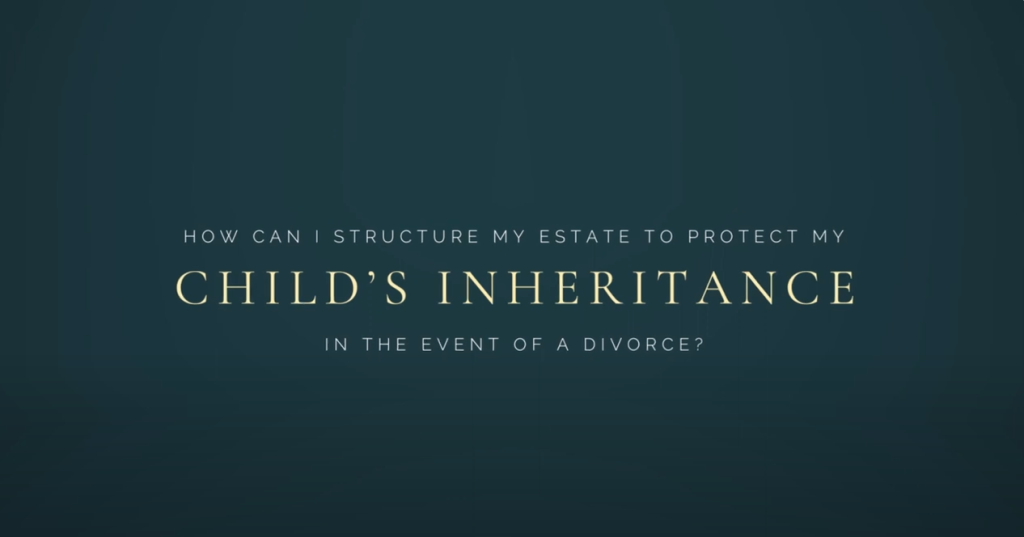For many parents, one of the biggest estate planning concerns is ensuring their children’s inheritances are shielded from potential divorces down the road. You’ve worked hard to build a legacy – the last thing you want is for those assets to become marital property subject to division with an in-law.
Fortunately, through strategic estate planning techniques, strong safeguards can be established to protect your children’s future inheritances if they go through divorce proceedings. At the Law Office of Andrew Fesler, structuring divorce-protected trusts is one of our key focus areas.
” In California, we are a community property state, and at the most basic level, what that means is, for a married couple, any assets that they earn from work during the marriage or any assets they acquire during marriage are community property, 50% owned by each spouse. There are some assets if acquired even during marriage that are not de facto community property. They’re called separate property. The most important one for most people is an inheritance and, of course, the most important one that we want to deal with in estate planning.
A lot of clients come to me and see, okay, if I leave these assets to my kids, what happens if they wind up getting divorced? How do we protect them from their spouse taking half of it? The way we do that is through a continuing trust. The irrevocable trust will create a continuing trust at the death of both spouses, will hold the assets for the benefit of the child. The child can be their own trustee if there are spendthrift provisions in that trust to protect it, but that continuing trust allows the inheriting child to keep those assets in the trust and reinvest them and use them but pull the assets out only as they need them. If they’re going on vacation, they can pull the money out for the vacation and leave the rest of the trust corpus in the trust.
That makes sure that that kid never does anything to co-mingle those assets and possibly have them considered community property upon a divorce. It also and sometimes even more importantly gives that child the political capital with their spouse to say, look, we’re not going to commingle these assets. Not because of what I want but because my parents set up this trust and the assets are supposed to be left in the trust according to their wishes and according to their law, so we can’t co-mingle these assets. They have to stay in my name. I will pull them out for things we need, but they are going to remain in that trust protected from that spouse if they decide to get divorced.”
The Inheritance Risks of Divorce
In most states, any assets or property acquired by either spouse during the marriage is considered community property or marital property in the event of a divorce. This can absolutely include future inheritances, which are effectively “co-mingled” with other marital assets.
Without proper inheritance protection planning, a court could award a significant portion of your child’s inheritance to their ex-spouse during property division. Or worse, careless commingling could accidentally convert the inheritance to community property in the first place.
The Power of Continuing Trusts
One of the most effective ways our firm protects clients’ children from having inheritances dissipated through divorce is with continuing trust. Also known as child’s trusts or dynasty trusts, these arrangements ensure inherited assets remain segregated as the child’s separate property.
Here’s how a continuing trust works:
Rather than an outright distribution of assets, your child’s inheritance remains in an irrevocable trust with stringent language stating the inheritance is for your child’s benefit alone. Your designated trustee oversees management and distributions according to your directives.
The trust essentially “walls off” inherited assets so they can never be considered community property in a divorce. Your child retains control of the trust and receives income/distributions, but the principal remains secure and segregated.
Additional benefits of continuing trusts include:
- Funds stay consolidated, making it easier to track distributions
- Trust assets are shielded from outside creditors and lawsuits
- Continuing trusts span multiple generations to protect wealth
- Inheritance can grow with professional asset management
- Trustees can restrict imprudent spending or influence
Coordinating Child’s Trusts Into Your Full Estate Plan
Of course, continuing trusts are just one component of inheritance protection in the event of divorce. At the Law Office of Andrew Fesler, we excel at developing comprehensive, multi-generational estate plans with interlocking safeguards, including:
- Revocable living trusts and pour-over wills
- Irrevocable life insurance trusts (ILITs)
- Qualified terminable interest property (QTIP) trusts
- Family limited liability partnerships (LLPs)
- Prenuptial and postnuptial agreements
We take a long-term, holistic approach to divorce-proofing estates aimed at preserving your family’s wealth through any domestic situation.
Divorce is stressful enough for children without added financial burdens. Let the Law Office of Andrew Fesler provide peace of mind that your children’s inheritances stay separate, secure, and destined for THEIR benefit alone.



